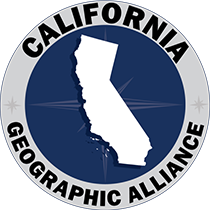The Encoding Geography RPP is an exciting collaborative effort supported by funding from the National Science Foundation (NSF) under the Computer Science for All funding program. An initial capacity building grant (Award #1837577) from November 2018 through October 2020 supported the formation of an initial partnership including the American Association of Geographers, California Geographic Alliance, Gilbert Grosvenor Center for Geographic Education at Texas State University, San Diego State University Department of Geography, and UC Riverside Center for Geospatial Sciences. San Diego Mesa College and Sweetwater Union High School District became formal partners in the RPP’s second successful grant proposal to NSF. The new collaborative research project (Award #2031418) began in January 2021 and continues through December 2023.
Open Access Resources:
Encoding Geography Curriculum Planning Tool (León et al. 2025) – a process and framework for developing relevant computational lessons for your students
Peer Reviewed Publications:
Nara, A., Embury, J., Velasco, M., Russell, R., Magdy, A., & Dony, C. C. (2024). Preparing for a Career at the Intersection of Geography and Computing: Availability and Access to Training Along Geocomputational Career Pathways. The Professional Geographer, 77(1), 55–83. https://doi.org/10.1080/00330124.2024.2404911
Solem, M., Dony, C., Herman, T., León, K., Magdy, A., Nara, A., Ray, W., Rey, S., & Russell, R. (2021) Building Educational Capacity for Inclusive Geocomputation: A Research-Practice Partnership in Southern California, Journal of Geography, 120:4, 152-159.
Project Reports and Outputs:
xyHt Digital Magazine (Dec. 5, 2022): Encoding Geography: Scale Up to Keep Up
CSU Geospatial Review (Spring 2019): Encoding Geography: Building Capacity for Inclusive Geo-Computational Thinking with Geospatial Technologies
AAG Newsletter (July 29, 2019) AAG’s Encoding Geography Initiative Sees Successes in First Year
Recommended Readings:
Computational Thinking: A cross-curricular approach (Story Map by Dr. Julie Oltman, January 2021)
Using Computational Thinking to Explore the Past, Present, and Future (article in Social Education Mar/Apr 2019 by T. Hammond, J. Oltman, and S. Salter)
Computational Thinking Is Critical Thinking. And It Works in Any Subject (article from May 2019 on EdSurge by S. Noonoo)
The Flexibility of Computational Thinking. Three middle school projects—in English, math, and history—use computational thinking skills to address social justice topics. (article from Edutopia, June 2018 by E. Sheldon)
On the Program for K–12: Computational Thinking. Joyce Malyn-Smith discusses how technology can help all students extend their own thinking and solve complex problems. (undated webpage of the Education Development Center)

